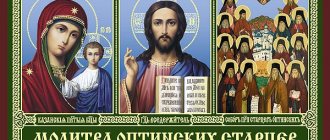The Gospel is a whole series of writings that tell about Jesus Christ, his life and deeds on earth. The Bible (New Testament) consists of four parts: the Gospel; before starting to read and after finishing any of the parts, you must read a prayer.
About the author About the book
Gospel readings can be done both at home and in church, alone or in a group of people. The main thing is to believe what is written and correctly understand the essence of what they wanted to convey to the reader.
Prayer is the basis of faith
There are many worries, dangers and temptations in the world. But many of them can be avoided if you pray for help and protection to the Lord, the Mother of God and the saints. Prayer is the communication of creation (man) with His Creator. Prayer saves a person, decorates his soul and helps him grow spiritually for future eternal life. God-loving Orthodox people pray collectively in the Church, alone at home, at work, and while traveling. Prayer before reading the Gospel occupies a special place.
Gospel in the Orthodox Church
The Holy Apostle Paul in his letter to the Thessalonians instructs us to pray unceasingly: “Rejoice always. Pray without ceasing. Give thanks in everything” (1 Thess. 5:16–18).
St. Neil of Sinai said the following about the benefits of prayer:
“The mother of all virtues is prayer: it can not only cleanse and nourish, but also enlighten and can make those who sincerely pray like the sun.”
St. Augustine speaks even more categorically:
“Not wanting to pray means not wanting to be with God. The disposition to pray often arises during prayer itself. He knows how to live well who knows how to pray well.”
Why constantly read the Gospel
The Lord Jesus left his children a real gift:
- messages;
- instructions;
- warnings;
- adviсe.
The Teacher revealed the meaning of the Good News during a meeting with the Samaritan woman (John 4:1-40), calling his teachings pure water, the thirst for which will move Christians in studying the depth of the essence of God.
Conversation of Jesus Christ with the Samaritan woman
Reading the holy epistle reveals the deity of Jesus through the mystery of His birth and resurrection, helps a person see his sinfulness and shows the way to eternal life through repentance. Through supernatural miracles such as turning water into wine (John 2:1-11), stopping a hurricane (Matthew 8:26), raising the dead (John 11:1-46) and others, Jesus showed that He was truly God , to whom was given authority in heaven and on earth.
The letters of the apostles will become a real adviser in any life issue, teach you to love people and submit to God, fulfilling His commandments, and reveal the essence of the Lord’s Prayer. (Matthew 6:9)
Reading passages about healing the sick, Christians are filled with faith that Christ will help them overcome serious illnesses.
Important! The Gospels for Orthodox Christians are a guiding star in the world of passions, sin and vices.
Why is prayer not magic?
The Holy Fathers and prophets warn against magic spells, conspiracies, and the services of sorcerers and psychics.
And when they say to you: turn to the summoners of the dead and to the sorcerers, to the whisperers and ventriloquists, then answer: should not the people turn to their God? Do the dead ask about the living? (Isa. 8:19).
A believer needs to be able to trust God. An example of such trust is the story from the Volokolamsk Patericon about a faithful peasant (recorded from the lips of Father Vassian, Archbishop of Rostov). The peasant was very ill for a long time and prayed for help to the holy Great Martyr Nikita. The patient's relatives advised him to invite a sorcerer for healing. But he refused and continued to fervently pray to the saint.
One night Saint Nikita, in the form of a bright man, appeared to a peasant and healed him. Then a black man with a fiery sword in his hand appeared next to them in the room and wanted to kill the healed man. But the saint forbade him, pointing out that the peasant did not go to the sorcerer.
Afterwards the peasant received an explanation from Saint Nikita. He learned that Christ had sent him to heal because he did not agree to call a sorcerer, but put his hope in God. And God added another 25 years to the peasant’s life. And the one who visited the sorcerer died that same night from the sword of the black man.
What text is read after the Bible?
It is equally important to complete your study of the Holy Scriptures correctly. After reading one or more chapters from the Bible, receiving revelation or instruction, you should say the following words:
Glory to You, Lord the King, Son of the living God, who made me unworthy to hear Your divine words and the voice of Your Holy Gospel; Therefore, with Your sovereign voice, strengthen me in the repentance of this present life so that the night may pass away, delivering me from all slander and malice of visible and invisible enemies: You are He alone is strong and reigns forever. Amen.
On the importance of reading the Gospel
“Man shall not live by bread alone, but by every word of God” (Luke 4:4).
In addition to the daily prayer rule, you need to nourish your soul by reading the Word of God - the Gospel (translated from Greek - “good, good news”). The Holy Fathers advise the Orthodox to read one chapter or beginning from the Gospel every day.
Conception - part of the text of the Gospel or the Apostle for liturgical reading in the temple on one day or another of the year. Gospel readings for every day can be found in the Orthodox calendar.
Reading the Holy Gospel instructs us and brings us closer to God. Saint John Chrysostom testified as follows:
“Reading Divine Scripture encourages and revives sorrowing and grief-stricken souls, destroying the power and heat of grief, delivering consolation that is more pleasant and sweeter than any shadow.”
Saint Theophan, the recluse of Vyshensky, gave instructions:
“Do not forget to read the Word of God every day, and meditate, and bring to the feeling, and thereby feed your soul. It’s as if the soul is sugared and becomes harder and stronger.”
The saints often read the Holy Gospel a lot, they literally fed on it, some knew it by heart. St. Seraphim of Sarov read the entire New Testament in one week. The saint said about reading the Word of God that for him it was a conversation with God:
“Through this, not only my soul, but also my body itself is delighted and spiritualized. When reading the Holy Scriptures, I talk with the Lord, keep His suffering in the memory of my life, and day and night I glorify, praise and thank my Redeemer for all His mercies poured out to the human race and to me, the unworthy.”
But do not think that the number of chapters read is the most important thing when reading Scripture. It is important to assimilate what you read so that good seeds from the Word of God fall into your mind and heart. And then they bore good fruit.
Reading Divine Scripture is like treasure. Just as one who receives even a small particle from a treasure acquires great wealth for himself, so in the Divine Scripture, even in a short speech, one can find great spiritual power and an indescribable wealth of thoughts (St. John Chrysostom).
How to Read Holy Scripture Correctly
Knowledge of the Bible begins with the New Testament, which describes the teachings of Christ. This book teaches people love and submission to the Lord, showing the path to salvation and eternal life next to the Almighty. But very often much is incomprehensible, especially for those who are just beginning to join the study of Scripture.
Therefore, for a deeper understanding of what is written, you need to adhere to certain rules while studying the Bible:
- Read in a calm environment, without rushing. It is better to do this in the evening, before going to bed, when all daily activities are completed and you can completely devote yourself to reading.
- Read a prayer appeal to the Lord, asking for blessings.
- You can read not entire chapters, but several paragraphs every day. But all parts must be interconnected, have a logical beginning and end.
- This should be done meaningfully, reflecting on what you read. Mechanical reading will not do any good.
- You can mark unclear points with a pencil so that you can later ask the priest for clarification.
Clergymen recommend starting the study of Scripture in Sunday school, gathering in small groups. Thanks to this, you can discuss some points together, and the spiritual guardian will be able to answer questions that arise in the process.
The main thing is to read Scripture with desire and faith in what is written. Gradually, an understanding of the sacred text will come and further strengthen faith in the Almighty.
Prayer before reading the Gospel
It is better to read the Holy Gospel in peace and solitude, so that no one and nothing distracts. Before reading the Gospel, you need to pray that the Lord will give you an understanding of what you read. If something remains unclear while reading, then do not be upset. The meaning of the Gospel is revealed gradually, as a person’s mind is purified and his spiritual growth occurs. And prayer before reading the Gospel is designed to help with this.
“The Holy Scriptures are all wrapped in secrets. There is depth, there is inexhaustible meaning. It is impossible to understand everything. Just as you can remove one scale from an onion, then another, a third, etc., this is the same in the Holy Scriptures: a person will understand one meaning, behind this meaning there is another deep one, behind the second there is a third, etc. . This is how the Lord enlightens the minds of His ascetics. In the Bible, in addition to the external side, there is also an internal side, that is, in addition to the bare facts, there is a deep transformative meaning of these same facts. This meaning is revealed as a person’s mind is purified” (elder Parthenius of Optina).
Four Gospels of the New Testament
Gospel is a term that refers to books: Matthew, Mark, Luke, John. All of them were written at different times by different people who were followers of Jesus and had strong faith in God. The Orthodox Church at the Council introduced these writings into the Bible (New Testament). The authorship of the Gospel (all 4 books) was determined later; initially the entries were anonymous.
John's writings differ from the rest in form and content. He can be distinguished when compared with others due to the sublimity of his thoughts, which is not surprising, since John Chrysostom was famous for his rich speech and deep thoughts, which his contemporaries did not always understand.
All 4 scriptures are united by a common meaning -
biography of the earthly journey of Jesus Christ: from beginning to end. This refers to birth and ascension.
It is interesting that, when speaking about the end of his life on Earth, no one mentions the crucifixion, since the Son of God was resurrected and appeared to the disciples after death. But each Gospel differs from the other in content - events are written that are not in the others. The books also contain sermons, parables and teachings. Many of the events described in them formed the basis of church holidays in the countries in which Christianity was adopted.
The first records date back to the 2nd century, but not so long ago (2015) a fragment of the Gospel of Mark was discovered. The fact that the authors are the apostles has previously been in doubt. This question was raised more than once among clergy at councils. Today, however, we have come to a consensus that the authorship of the Gospel should be confirmed, which has been done, because during his lifetime, those closest to Christ were his disciples and followers - the apostles.
So, it would be correct to consider
that some of them took notes, which there are indirect indications of.
Among the books of the Gospel there are also those that are not accepted as canonical (apocrypha). The reason for this is doubt about the truth of the events described. These include quite a lot of writings: from the Egyptians, Jews, Essenes, Peter, Nicodemus, Thomas, Jude, etc.
Today, the contents of the books of Holy Scripture are read in Divine Services, as Jesus commanded, in order to glorify the Most High: “Preach the Gospel to every creature.” The liturgical copy is usually richly decorated. The text is read in Old Church Slavonic; it is in this language that sermons, parables, and the biography of Christ’s earthly journey are written.
How to pray before reading the Gospel
The main prayer before reading the Gospel, which is placed at the end of the 11th kathisma of the Psalter:
“Shine in our hearts, O Lord who loves mankind, the imperishable light of Your knowledge of God, and open our mental eyes, our understanding in Your gospel sermons, put fear in us and in Your blessed commandments, so that all carnal lusts may be trampled, we will pass through spiritual life, even to please Yours in both wisdom and action. For You are the enlightenment of our souls and bodies, O Christ God, and we send up glory to You, with Your Originless Father and Your All-Holy, Good, and Life-giving Spirit, now and ever, and unto the ages of ages. Amen".
To this prayer you can add the following words, which are usually read in church before reading the Gospel at the Liturgy or during a prayer service:
From... (name of the Evangelist) Holy Gospel reading. Glory to Thee, our God, glory to Thee.
At the Liturgy before the Gospel we will not hear the prayer “Shine in our hearts, O Lord who loves mankind, your imperishable light of knowledge of God...”. The priest in the altar reads it secretly, in a whisper or in a low voice. And he asks that the read Gospel bear good fruit for all those who pray.
Saint John Chrysostom advises:
“When you sit down to read the Holy Scriptures, first pray to God that He will open the eyes of your heart.”
Children and the Gospel
Family traditions are determined by the religion adopted by parents and close relatives. Children at the initial stage of development (in early childhood) become familiar with the Divine. This happens if family members are churchgoers. Then children grow up receiving knowledge of prayers and rules. Gospel books occupy not the last place. However, it is necessary to introduce descendants to new knowledge first through the non-canonical Gospels. They require less explanation and are more understandable to children.
Video: Pages of the Gospel: “You hid these things from the wise and understanding and revealed them to babes” (Matthew 11:25)
Suggestions for reading the holy letter
Everyone knows that studying the Bible begins with reading the Gospel. Of course, in order to get the most out of reading, you need to do it correctly. Many priests claim that there are some recommendations for reading the holy letter. Namely:
- The first is an honest attitude to business. In other words, you need to start reading the Gospel with all responsibility and seriousness. If you started reading it and have preconceived views on it, then believe me that you will not get any benefit from it.
- Secondly, treat this matter in good faith. In order for reading not to be irregular, there must be a desire. To understand at least a small part of it, you need to not just read it, but delve into its meaning.
Hieromonk Job (Gumerov) answers:
The Gospel word, read for the health and well-being of children and other loved ones, is always effective and beneficial. The Holy Fathers advise asking the Lord for help before starting to read the Holy Scriptures. St. Ephraim the Syrian writes: “When you sit down to read or listen to someone reading, pray first to God, saying: “Lord, open the ears and eyes of my heart, so that I may hear Your words and do Your will” (Ps. 119:18). “I hope, my God, that You will enlighten my heart” - always pray to God so that your mind will be enlightened and the power of His words will be revealed to you. Many, relying on their own understanding, fell into error and, “professing to be wise, became fools” (Rom. 1:22).” Likewise, the Monk Isaac the Syrian instructs: “Do not approach the words of the sacraments contained in the Divine Scripture without prayer and asking for help from God, but say: “Grant me, Lord, to receive the feeling of the power contained in them.” Consider prayer as the key to the true meaning of what is said in the Divine Scriptures.”











